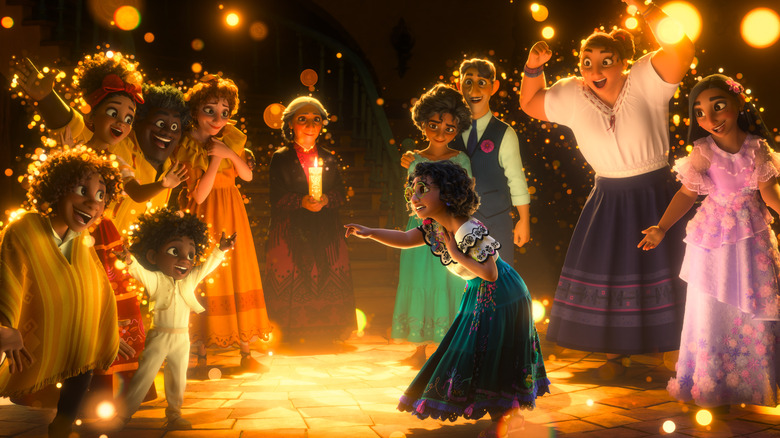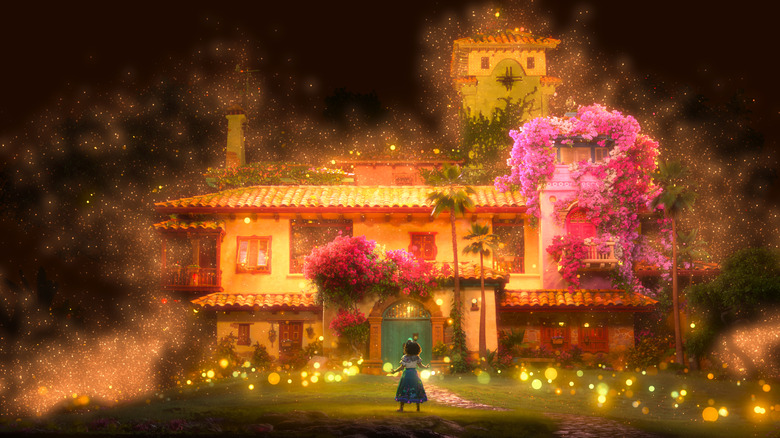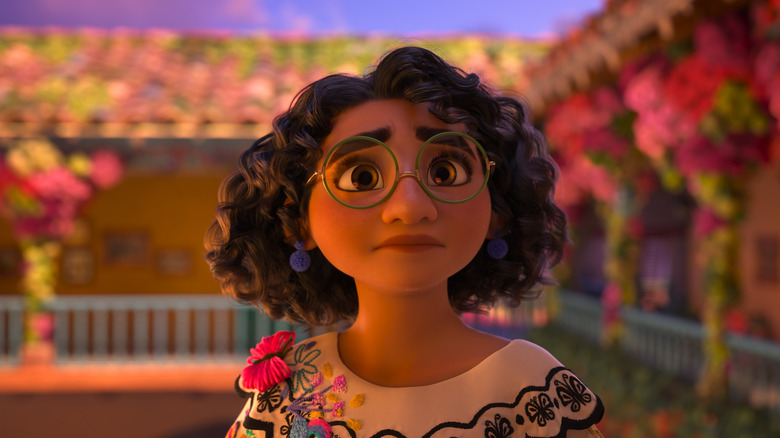Encanto Review: A Sweet But Formulaic New Disney Adventure

Walt Disney Animation Studios has come a long way since the arrival of its first full-length animated feature, "Snow White and the Seven Dwarfs," nearly 85 years ago. The studio's massive legacy is hard to shake when watching their 60th animated feature, "Encanto," in part because the new film is proof of how many strides have been made by its animators and creative team (a majority of those long-overdue strides made in just the last decade). But it's also hard to shake because "Encanto" depicts the limitations of the formulaic elements that mark some of Disney Animation's stories, magical worlds, and characters.
At the outset, it's worth acknowledging a few things about "Encanto." This is an often beautiful film to look at, with crisp and colorful design work, sometimes surprisingly photorealistic character touches, and creative and stylishly fantastical musical sequences. The film, set in Colombia, has a distinctive and welcome sense of place and culture, and its cast was clearly selected less for name recognition and more for being the right actors for the right roles. This film's strengths are largely connected to its singular voice, and the sense that Disney Animation could not have made a film so proudly, deservedly non-white until now. "Encanto" has its weaknesses, but none of them have anything to do with the film's cultural specificity, but instead with what seems to be the house style of storytelling at both Disney and Pixar these days.
"Encanto" depicts the lives of the Madrigal family, whose humble abode is magical, and not just metaphorically. Some 50 years ago, Alma Madrigal and her husband fled their home with their triplets, and after a family tragedy, some unknown but powerful magic appeared out of thin air like a miracle to conjure up a massive house for Alma and her family to live in, while also imbuing her children and their descendants with specific powers, from controlling the weather through emotions, to super-strength, to shape-shifting. In the present, Alma (voiced by Maria Cecilia Botero) is now an abuela, and everyone in the family keeps their personal bonds strong through their powers ... except young Mirabel (Stephanie Beatriz), the only Madrigal never gifted with a power by the house. Yet when the house's magic, represented by an always-burning candle at its center, begins to dim and the house itself starts to literally split open, only Maribel can save the miracle.
Likable And Fine Without Being Great

There's a lot to like in "Encanto," though the film, directed by Byron Howard and Jared Bush of "Zootopia," and co-directed by Charise Castro Smith, never pushes beyond being likable, and sometimes barely that. One oddly absent note in the marketing has been the songwriting presence and prowess of the massively talented Lin-Manuel Miranda. Perhaps it's due to the songs in "Encanto" being ... well, fine. It's weirdly appropriate that one of the songs, "Surface Pressure," is performed by Mirabel's super-strong sister Luisa (Jessica Darrow) and is all about how Luisa worries that she can't handle the burden and strain of being powerful enough to handle all that life throws at her. After writing the songs for "Moana" and also the worldwide phenomenon that is "Hamilton," the bar is probably far too high for Miranda to clear, as it would be for most songwriters. None of the songs in "Encanto" rise above being serviceable, paling in comparison to Miranda's work in "Moana." (Earlier this year, Netflix released another animated film featuring songs by Miranda, "Vivo," in which he starred as the title character. "Encanto" is overall a better film, but the songs are better in "Vivo.")
That said, the way that Disney's animators visualize what's occurring in the songs is the high point of "Encanto." The lyrics aren't always as clever, and the tunes not quite as catchy as they should be, but when Luisa sings of her personal neuroses, or when Mirabel's frustratingly perfect sister Isabela (Diane Guerrero) sings "What Else Can I Do?", in which she explores her power of bringing various flora and fauna to life, it's animated with depth and boundless creativity that showcases the talents of the hundreds upon hundreds of men and women who bring Disney flair to every frame.
"Encanto" partly has the misfortune of utilizing a mishmash of formulaic elements seen in plenty of other Disney and Pixar films, without being able to avoid those elements being noticeable. Mirabel's perception of being different is only exacerbated by her abuela, and while the idea of a protagonist being an outsider who wants to be accepted by the community is perfectly relatable, it is also very much the cornerstone of a ton of Disney and Pixar films, from "Moana" to "Ratatouille" to even "A Bug's Life." Though "Encanto" comes from Disney Animation, the Pixar connection feels worth noting, in part because the formula that marked many of Disney's earliest classics, and everything up to the Disney Renaissance, shifted with the arrival of Pixar in the mid-1990s. And that studio's impact is clearly felt more than 25 years later. (Miranda noted at the time of "Moana" that he and Howard were working in early development on an idea presented to them by ex-Pixar honcho John Lasseter, and now ... well, here we are.)
Nudging The Limits, Instead Of Pushing Them

To its credit, "Encanto" does not fall into the buddy-comedy trope that marks so many recent Disney and Pixar films. The closest the film comes to approaching pairing Mirabel with a mismatched buddy is with her mysterious uncle Bruno (John Leguizamo, who's predictably very funny), whose gift of seeing into the future is more of a curse based on how his predictions mostly frustrate those around him. But Bruno is talked about as much as he's seen, and while Leguizamo is a high point, it's somewhat because he's only in so much of the film's second half. The most noticeable trope carried over from the Pixar days, one that desperately needs to go from Disney and Pixar on the whole, is the lack of a true antagonist. There are mysterious forces at work in "Encanto," and the film wisely doesn't weigh itself down with dull, exposition-heavy details regarding those forces. But Mirabel's struggles are familial and also internal, as has been the case for so, so, so many other recent animated films. Disney is right to celebrate "Encanto" as its 60th film. They ought to. It's a big milestone. It would just be nice if one day, the creative minds at the studio (or perhaps the executives overseeing the studio) remember that few of their great animated stories exist without both memorable heroes and memorable villains.
Disney's animated legacy is far from perfect. There is an understandable corrective notion embedded in the existence of films like "Moana," "Coco," and "Encanto," to prove that the studio has learned its lessons -- even if it took far too long to do so -- and is able to present warm and loving portraits of non-white culture. Considering the sometimes deeply offensive depictions of those cultures in earlier Disney films -- even through films like "Aladdin" -- movies like "Encanto" are more than welcome. It's good that a story like this exists. But coming after both "Moana" and "Coco," and also stories like "The Princess and the Frog" and "Raya and the Last Dragon," "Encanto" has the harder task of standing apart from the crowd but with the recognizable Disney formula. This is a perfectly likable, charming film, and if you're comfortable doing so, you should see it in theaters before it heads to Disney+ in late December. But for films like "Encanto" to truly stand out, instead of being content with being good enough, they need to push storytelling limits as much as they push cultural ones.
/Film Rating: 7 out of 10
Read this next: All 58 Walt Disney Animation Studios Films Ranked From Worst To Best [Part One]
The post Encanto Review: A Sweet But Formulaic New Disney Adventure appeared first on /Film.
from /Film https://ift.tt/3cfqtFq
No comments: